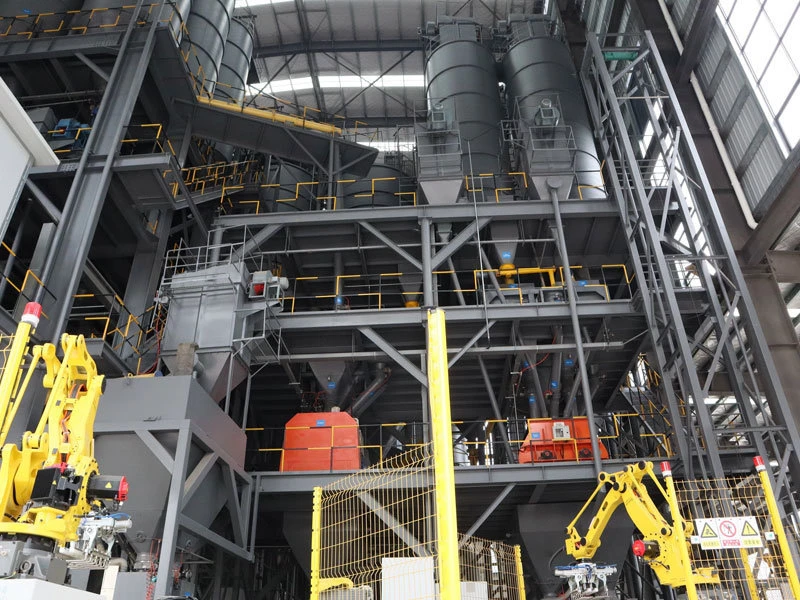What is the difference between a gypsum mortar production line and a dry mortar production line?
Gypsum mortar production lines and dry mortar production lines share similarities in their basic process of mixing and packaging powdered materials, but they serve different purposes and are designed for distinct applications. Here are the key differences between a gypsum mortar production line and a dry mortar production line:

1. Main Component:
- Gypsum Mortar Production Line: Gypsum mortar specifically uses gypsum as a primary binder. Gypsum is a soft sulfate mineral commonly used in construction for its fire-resistant properties.
- Dry Mortar Production Line: Dry mortar, in a general sense, refers to mortar that does not contain liquid components at the time of application. It can include various formulations based on the construction requirements, such as cement-based, lime-based, or gypsum-based mortars.
2. Binder Composition:
- Gypsum Mortar Production Line: Gypsum mortar is primarily composed of gypsum powder, water, and aggregates. Gypsum acts as the primary binder.
- Dry Mortar Production Line: Dry mortar can have various binders, including cement, lime, gypsum, or a combination of these, depending on the type of mortar being produced (e.g., cement-based mortar, lime mortar, or gypsum-based mortar).
3. Applications:
- Gypsum Mortar Production Line: Gypsum mortar is often used in applications where fire resistance is a crucial factor, such as in the construction of fire-resistant walls and ceilings.
- Dry Mortar Production Line: Dry mortar, in a broader sense, can be used for a wide range of applications, including masonry, plastering, tiling, grouting, insulation, and more. The specific application depends on the formulation of the dry mortar.
4. Properties:
- Gypsum Mortar Production Line: Gypsum mortar is known for its fire-resistant properties and is often used in fire-rated assemblies. It also has good thermal insulation properties.
- Dry Mortar Production Line: Properties vary based on the type of dry mortar produced. For example, cement-based dry mortars are known for their strength and durability, while lime-based mortars offer flexibility and breathability.
5. Setting Time:
- Gypsum Mortar Production Line: Gypsum mortar typically has a relatively fast setting time compared to other types of mortar, making it suitable for certain applications.
- Dry Mortar Production Line: Setting times can vary depending on the specific formulation of the dry mortar, allowing for customization based on project requirements.
6. Use in Specialized Applications:
- Gypsum Mortar Production Line: Gypsum mortar is commonly used in specialized applications where fire resistance and thermal insulation are critical, such as in certain types of drywall systems.
- Dry Mortar Production Line: Dry mortar production lines are versatile and can be tailored for a wide range of construction applications, offering flexibility in formulation.
In summary, while gypsum mortar is a specific type of dry mortar that uses gypsum as a primary binder and is known for its fire-resistant properties, dry mortar production lines can produce a variety of mortars with different binders to suit diverse construction needs.